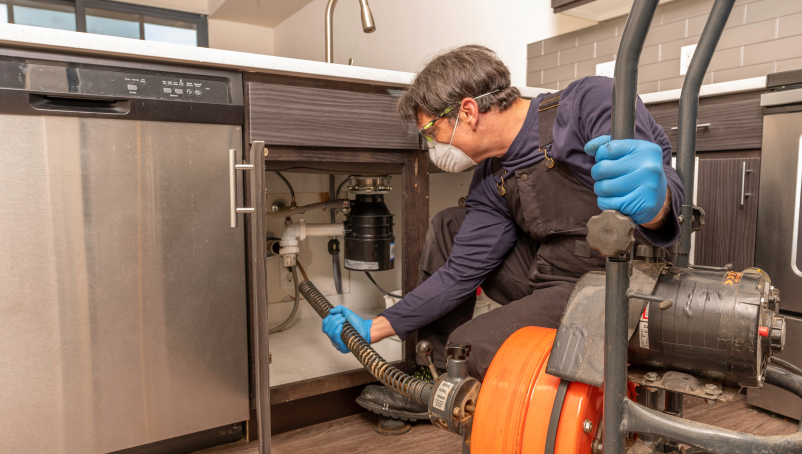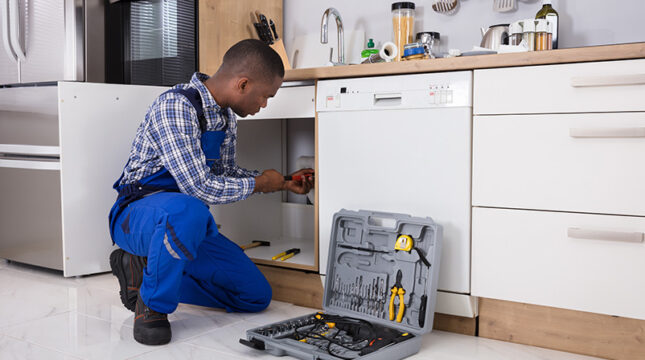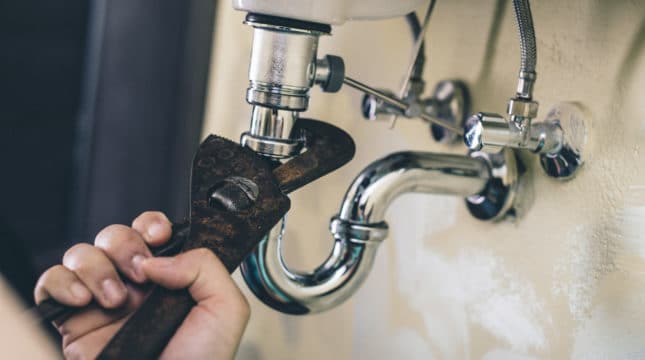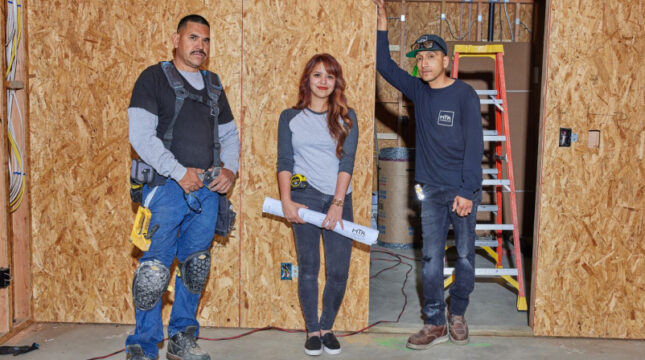Do you need a Minnesota plumbing license to work?
Yes, you need a license to be a plumbing contractor in Minnesota. Licensing ensures that plumbers meet safety standards and adhere to local codes. Working without a license can lead to severe consequences, including fines and legal issues.
An individual not licensed as a plumber may only perform plumbing work in the state of Minnesota if they are registered with the Minnesota Department of Labor and Industry (DLI) as a registered unlicensed plumber (formerly known as an apprentice).
Minnesota has several types of plumbing licenses: journeyworker (formerly journeyman), master plumber and contractor.
- Journeyworker license: This license allows you to work as a plumbing employee under a master plumber. Journeyworkers can install, repair, and maintain plumbing systems. They can also supervise registered unlicensed plumbers. To obtain this license, you must complete a plumbing apprenticeship (or have experience working as a registered unlicensed plumber) and pass the licensing exam.
- Master plumber license: This is the highest level of Minnesota plumbing license. Master plumbers can take on more complex projects and work independently. They are qualified to design plumbing systems, manage other plumbers, and obtain permits. You need a journeyworker license and several years of experience to earn this license.
- Contractor license: If you want to operate as a plumbing contractor and own your own business, you need this license. It allows you to manage plumbing work for clients, hire other plumbers, bid on projects, and sign contracts. To apply for a contractor license, you must have a master plumber license, proof of insurance, and a surety bond.
Each license type has its specific roles and responsibilities, ensuring that licensed plumbers are equipped to handle various plumbing tasks safely and effectively. Minnesota also has related restricted licenses and specialty credentials.
Insurance requirements for a Minnesota plumbers license
If you are a plumbing contractor, consider getting Minnesota business insurance to protect your small business. Some of the following are required to get your license; others are optional to safeguard your business from unexpected financial losses.
Workers’ Compensation insurance
If you own a business in Minnesota, you must carry workers’ compensation insurance by law. No minimum number of employees is required before insurance is required; even if you have just one part-time employee, you must provide coverage.
Workers’ compensation insurance can help provide employees with medical benefits and wage replacement if they’re injured or contract an illness on the job. It can help protect business owners from significant financial losses after an accident.
Learn more about workers’ compensation for contractors.
General Liability insurance
General liability insurance helps provide financial protection when things go wrong. If someone (other than an employee) claims that your business caused them bodily injury, causes property damage or advertising or reputational harm, this policy can help cover related costs.
In Minnesota, plumbing contractors must carry liability insurance with minimum coverage limits of $50,000 per person and $100,000 per occurrence. License holders must ensure the DLI is listed as a certificate holder.
Learn more about general liability insurance for contractors.
Commercial Property insurance
Commercial property insurance helps cover damage or vandalism to your equipment and inventory. It can also cover lost income, operating expenses and repairs to your building.
Business Owner’s Policy
A business owner’s policy (also called BOP insurance) combines general liability and commercial property policies into a single, cost-effective bundle. It can help cover property damage you or your staff may cause, while protecting your business equipment and structure in case of a fire or other covered event.
Tool and Equipment insurance
Tools and equipment insurance protects your gear and can help cover repairs or replacements if it is stolen or destroyed on the job. At NEXT, it’s an add-on policy to general liability.
Commercial Auto insurance
As a plumber, you are always driving between different job sites. Commercial auto insurance can help cover costs associated with accidents, such as property damage and medical expenses. Even if you drive a personal vehicle that has auto insurance, check with your insurer because they may not cover all business-related activities.
Minnesota’s minimum coverage limits are:
- Bodily injury liability: $30,000 per person and $60,000 per accident
- Property damage liability: $10,000
How to get a plumbing license in Minnesota
Obtaining a plumbing license in Minnesota involves several key steps. Follow these steps to help you navigate the process.
1. Meet educational requirements
You typically need a high school diploma or GED to qualify for a plumbing license. Taking relevant courses in math, physics and plumbing technology can also be beneficial.
2. Gain plumbing experience
Consider enrolling in a formal apprenticeship program and gaining experience as a registered unlicensed plumber. You can work under the supervision of a licensed plumber and learn the skills necessary for the job. From there, you can gain the experience to move on to journeyworker and eventually become a master plumber.
Each license type has specific experience requirements. See DLI’s experience page for specific hours and requirements.
Journeyworker license: To obtain a journeyworker license, you typically need one of the following:
- At least four years of recorded practical plumbing experience as a DLI-registered unlicensed plumber.
- Completed a DLI-registered apprenticeship program.
- A current Minnesota restricted journeyworker plumber license or a restricted master plumber license and at least two years of practical plumbing experience gained while holding the restricted plumber license.
- A current plumber’s license from another state where the licensing jurisdiction requires at least four years of practical plumbing experience and an examination to qualify for licensure.
Master plumber license: For a master plumber license, you need one of the following:
- At least one year of practical plumbing experience as a licensed journeyworker plumber.
- A current master plumber license from another state where the licensing jurisdiction requirements are equivalent to those of Minnesota, as determined by DLI.
- A current Minnesota restricted master plumber license and five years of verifiable experience in business as a plumbing contractor in Minnesota.
Contractor license: To become a licensed plumbing contractor, you must be a licensed master plumber. There are no specific additional experience requirements for the contractor license.
3. Pass the licensing exams
After completing your education and experience requirements, you’ll want to pass the corresponding licensing exam. These tests assess your knowledge of plumbing codes, regulations and practices. All plumbing exams are approximately 5.5 hours.
You can apply online to take the exam and pay the $50 exam fee. Once approved, you will receive instructions on how to schedule the exam. After you have passed the exam, you’ll receive instructions on how to pay for your license.
4. Apply for your license
Once you pass the exam, you can apply for your Minnesota plumbing license. Gather the necessary documents, such as proof of experience, exam results and required license fees. Submit your application to the Minnesota Department of Labor and Industry’s iMS license management system.
5. Obtain insurance and bonds (for contractors)
If you plan to operate as a plumbing contractor, you’ll need to secure general liability insurance and a surety bond for $25,000. These protect you and your clients, ensuring you can cover potential damages or losses.
If you have employees, you will also need workers’ compensation insurance. See the insurance and bond requirement sections below.
Minnesota plumbing contractor license requirements
To become a licensed plumbing contractor in Minnesota, you must meet several key requirements. Here’s a breakdown of what you need:
- Designate a responsible licensed individual. You must identify a licensed individual responsible for your company’s plumbing license.
- Provide proof of insurance. You will need to submit evidence of public liability and workers’ compensation insurance. Proof of insurance can be an ACORD certificate or a DLI-approved certificate.
- Submit a $25,000 surety bond. The bond must be on a form approved by the DLI and issued by a corporate surety authorized to conduct business in Minnesota.
- Disclose business ownership information. You are required to disclose details about the business owners, partners, officers and members. Failing to provide complete information may delay the review and approval of your application.
- Complete the license application and pay the fee. During the online application process, ensure that all necessary forms are filled out and ready for upload to iMS. The fee for the initial license application is $188.
Minnesota plumbing contractor bond requirements
Plumbers applying for their contractor license must provide a $25,000 surety bond written by a corporate surety licensed to do business in Minnesota.
Plumbing license reciprocity in MN
Minnesota has reciprocity agreements with North Dakota and South Dakota. Applicants from those states may obtain a Minnesota journeyworker or master plumber license without examination if they obtained corresponding licenses in those states.
Minnesota plumbing license renewals
License holders can submit renewal applications online.
- Registered unlicensed plumbers must renew their registration by June 30 of each year.
- Journeyworker plumbers’ licenses must be renewed by December 31 in odd-numbered years.
- Master plumbers’ licenses must be renewed by December 31 in even-numbered years.
- Plumbing contractor licenses are valid for two years.
Master and journeyworker plumbers must complete 16 hours of approved continuing education (CE) per two-year license period through online classes. Unlicensed plumbers must earn two hours of CE by June 30 annually, with the hours earned before the registration’s expiration date.





